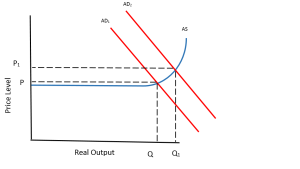Increasing levels of employment might be considered to be beneficial for the economy. As with other policy objectives, achieving full employment may well create trade-offs. One trade-off may be balance of payment difficulties.
Benefits of rising employment levels
Increasing employment is generally considered to be desirable. As employment levels rise this may be expected to lead to an increase in aggregate demand.
Aggregate demand may increase as a result of investment increasing productive capacity or, increased government expenditure to improve infrastructure. Aggregate demand may also increase as a result of higher levels of consumer spending, arising from increased employment.
If increased employment coincides with improved efficiency then UK exports may be able to exploit a cost advantage.
Downside of rising employment levels
As unemployment levels are reduced labour shortages may start to occur. Upward pressure on wage levels to rise may increase, causing the costs of firms to rise. Firms will have two choices – 1. Absorb the higher costs themselves or, 2. Pass the cost on to customers.
The choice taken will be determined by the availability of substitutes and the price elasticity of demand. For exporters, rising costs may erode their competitiveness, making it harder for them to sell their products abroad. Importers may find it relatively easier to sell their products in the UK.
Rising costs and erosion of international competitiveness are likely to be reflected in the Current Account of the Balance of Payments and influence exchange rate movements. Rising costs and higher priced goods may reduce demand for sterling. At the same, imported goods may become relatively cheaper, leading to increased demand for foreign currencies. The cumulative effect may be seen in sterling depreciation and a deficit in the balance of payments.
Government intervention
The UK Government has found it necessary to adopt stop-go policies in the past, in order to address the problem of Balance of Payments deficits. Records reveal that when the UK economy starts to grow the balance of payments move into deficit. The Government has been forced to curb demand using fiscal and/or monetary policies. The problem of rising levels of employment leading to adjustments in the balance of payments and exchange rates reinforces the point that, economies do suffer from inherent instability. As a result, economic growth and other macroeconomic indicators tend to fluctuate.
During the 1950s and 1960s successive Governments experienced difficulty in maintaining low levels of unemployment. The economy shifted from recession to boom to recession in a STOP-GO CYCLE.

